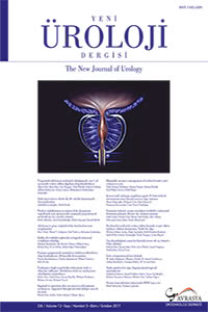Bir sağlık kurumunda çalışan erkeklerin prostat kanseri taramalarına yönelik tutum ve inançları ile bilgi düzeyleri arasındaki ilişki
prostat kanseri, tarama, tutum, inanç, bilgi düzeyi
Relationship between the prostate cancer screening attitudes, beliefs, and knowledge levels of men working in a healthcare institution
prostate cancer, screening, attitude, belief, knowledge level,
___
- Türkiye Kanser İstatistikleri, 2017. Ankara, 2021. available from: https://hsgm.saglik.gov.tr/depo/birimler/kanserdb/istatistik/Turkiye_Kanser_Istatistikleri_2017_OZETLI.pdf
- Catalona WJ. Prostate cancer screening. Medical Clinics. 2018;102:199‐214. https://doi.org/10.1016/j.mcna.2017.11.001
- Mottet N, Bellmunt J, Bolla M, Briers E, et al. EAU-ESTRO-SIOG Guidelines on Prostate Cancer. Part 1: Screening, Diagnosis, and Local Treatment with Curative Intent. Eur Urol. 2017;71(4):618-629. https://doi.org/10.1016/j.eururo.2016.08.003
- Arafa MA, Rabah DM, Wahdan IH. Awareness of general public towards cancer prostate and screening practice in Arabic communities: A comparative multicenter study. Asian Pac J Cancer Prev 2012;13(9):4321-6. https://doi.org/10.7314/APJCP.2012.13.9.4321
- Sahu DP, Subba SH, Giri PP. Cancer awareness and attitude towards cancer screening in India: A narrative review. J Family Med Prim Care 2020;9:22148. https://doi.org/10.4103/jfmpc.jfmpc_145_20
- Çapık C, Gözüm S. Development and validation of health beliefs model scale for prostate cancer screenings (HBM-PCS): Evidence from exploratory and confirmatory. European Journal of Oncology. 2011;15:478-485. https://doi.org/10.1016/j.ejon.2010.12.003
- Baysal HY, Gözüm S. Effects of health beliefs about mammography and breast cancer and telephone reminders on re-screening in Turkey. Asian Pacific Journal of Cancer Prevention. 2011;12:1445-1450.
- Awosan KJ, Yunusa EU, Agwu NP, Taofiq S. Knowledge of prostate cancer and screening practices among men in Sokoto, Nigeria. Asian Journal of Medical Sciences. 2018;6(6):51-56. http://dx.doi.org/10.3126/ajms.v9i6.20751
- Bilgili N, Kitiş Y. Prostate cancer screening and health beliefs: A Turkish study of male adults. Erciyes Med J. 2019;41(2):164-169. https://doi.org/10.14744/etd.2019.45762
- Ceyhan Ö, Göriş S, Demirtaş A, Kılıç, Z. Knowledge levels of male patients about prostate cancer screening. Kırıkkale Uni Med J 2018;20(2):184-191. https://doi.org/10.24938/kutfd.383092
- Demirbaş N, Onmaz M. An evaluation of men’s beliefs and perceptions and affecting factors on prostate cancer screenings with the health belief model. The Turkish Journal of Family Practice. 2021;25(4):137-144. https://doi.org/10.54308/tahd.2021.52714
- Köse Tosunöz İ, Deniz Doğan S. Male’s attitudes and levels of knowledge about prostate cancer screening. Izmir Democracy University Health Sciences Journal. 2022;5(3):651-663.
- Arli SK, Bakan AB. Effects of the training about prostate cancer and screening methods on knowledge level. Nursing Science Quarterly. 2019;32(4):333-339. https://doi.org/10.1177/0894318419864345
- Jeong JH, Park NH. A structural equation modeling of prostate cancer screening intention. J Korean Acad Community Health Nurs. 2019;30(4):471-483. https://doi.org/10.12799/jkachn.2019.30.4.471
- Çapık C, Gözüm S. Turkish adaptation of the knowledge about prostate cancer screening questionnaire. Turkish Journal of Geriatrics. 2011;14(3):253-258.
- Karagöz Y. SPSS 21.1 Uygulama, Biyoistatistik. 1. Basım. Ankara: Nobel Akademik Yayıncılık, 2014.
- Tayhan A, Özmen D. Relationship between knowledge levels of men about prostate cancer screenings and their health literacy. Cukuova Med J. 2019;44(4):233-240. https://doi.org/10.17826/cumj.560673
- Ilic D, Djulbegovic M, Jung JH, et al. Prostate cancer screening with prostate-specific antigen (PSA) test: A systematic review and meta-analysis. The BMJ. 2018;362:1-12. https://doi.org/10.1136/bmj.k3519
- Gandaglia G, Leni R, Bray F, et al. Epidemiology and prevention of prostate cancer. European Urology Oncology. 2021;4(6):877-892. https://doi.org/10.1016/j.euo.2021.09.006.
- Odedina FT, Campbell ES, LaRose-Pierre M, Scrivens J, Hill A. Personal factors affecting African-American men’s prostate cancer screening behavior. Journal of the National Medical Association. 2008;100(6):724-733. https://doi.org/10.1016/S0027-9684(15)31350-X
- Ghodsbin F, Zare M, Jahanbin I, Ariafar A, Keshavarzi S. A survey of the knowledge and beliefs of retired men about prostate cancer screening based on health belief model. Int J Community Based Nurs Midwifery 2014;2:27985.
- Alshammari S, Alojayri R, AlJehani M, et al. The association between the knowledge on prostate cancer screening with the beliefs and behaviors of Saudi men attending King Khalid University Hospital. J Family Med Prim Care. 2021;10(12):4423-4430. https://doi.org/10.4103/jfmpc.jfmpc_828_21
- Çapık C, Gözüm S. The effect of web-assisted education and reminders on healthbelief, level of knowledge and early diagnosis behaviors regarding prostate cancer screening. Eur J Oncol Nurs 2012;16(1):71-7. https://doi.org/10.1016/j.ejon.2011.03.007
- Weinrich SP, Seger R, Miller BL, et al. Knowledge of the limitations associated with prostate cancerscreening among low-income men. Cancer Nurs 2004;27(6):442-53. https://doi.org/10.1097/00002820-200411000-00003
- ISSN: 1305-2489
- Yayın Aralığı: 3
- Başlangıç: 2005
- Yayıncı: Pera Yayıncılık
Açık basit prostatektominin seksenliklerde güvenilirlik ve etkinliği: Tek merkez deneyimi
Nadir KALFAZADE, Fatih AKKAŞ, Emre ŞAM, Kamil Gökhan ŞEKER, Ekrem GÜNER, Selçuk ŞAHİN, Volkan TUĞCU
Feokromositoma ameliyatı geçiren hastalarda kan basıncı, kan şekeri ve kreatinin değişiklikleri
Prashant SEVACH, Govind SHARMA, Shivam PRİYADARSHİ
İrem Nur OZDEMİR, Figen ÇALIŞKAN, Yavuz Onur DANACİOGLU
Erkekler için Cinsel Memnuniyet Ölçeği’nin (CMÖ-E) Türkçe formunun geçerlik güvenirlik çalışması
Serpil ABALI ÇETİN, Gürkan KARADAĞ
Mesane ürotelyal karsinomlarında Cyclin-D1 immünohistokimyasal ekspresyonunun araştırılması
Mehmet EZER, Fatma YILMAZ ERTÜRK, Hatice BEŞEREN, Yasemen ADALI
Akne vulgarisli genç bir hastada oral izotretinoin tedavisiyle ilişkili gros hematüri
Anıl ERDİK, Hacı İbrahim ÇİMEN, Yavuz Tarık ATİK, Deniz GÜL, Musa PINAR
Hamide Ayben KORKMAZ, Yilmaz APAYDIN, İlkay CEYLAN
Bitkisel bir ajan “Tutukon®”un üreter taşlarının spontan pasaj oranlarına etkisi
Rasim GÜZEL, Laurian DRAGOS, Ümit YILDIRIM, Bilal ERYILDIRIM, Kemal SARICA
